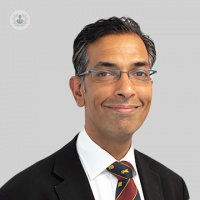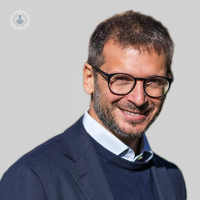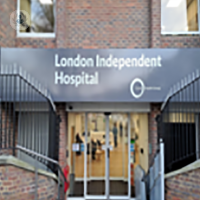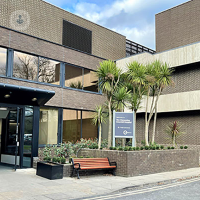What is laparoscopic hernia surgery?
Laparoscopic hernia repair is a minimally-invasive surgery performed with general anaesthesia. A laparoscope is a flexible, thin instrument with a light source and camera on the end. It is inserted through small incisions made in the abdomen, depending on where the hernia is. The surgeon is then able to use this camera to guide his surgical repair.
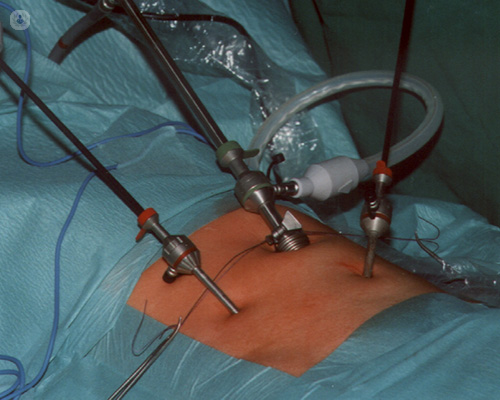
Why is it done?
Laparoscopic hernia surgery is less invasive than open surgery and leaves just three small scars instead of one large one. As a result, there is less pain following surgery and a quicker recovery period. Patients are able to return to normal activities sooner than after having open hernia repair surgery.
What does it involve?
During laparoscopic hernia surgery, the abdomen is inflated with carbon dioxide gas to allow a better view for the surgeon. The surgeon performs the repair of the hernia using stitches and synthetic mesh which provide reinforcement of the abdominal walls. Once repaired, the small incisions are closed with stitches or surgical tape. These stitches will dissolve over time and do not require later removal.
How do you prepare for laparoscopic hernia surgery?
Before laparoscopic hernia surgery is recommended by your specialist, you will have had a thorough physical examination, an MRI scan and an ECG to assess your cardiac health. You will also be given general anaesthesia for this surgery and you won’t feel anything during the procedure. As such, food, drink and certain medications will have to be stopped for a certain period before the operation.
Aftercare:
After laparoscopic hernia surgery, patients can normally return home the same day, providing they are not experiencing a lot of pain, nausea or vomiting. You can expect to be a bit sore for the first couple of days after surgery, but this can be managed with rest and painkillers. You should be able to walk around after surgery, working up to more strenuous activity slowly over the following two weeks. It is important to eat high-fibre foods during recovery to avoid constipation and straining on the toilet.
Alternatives to this treatment:
Hernias may also be repaired using open surgery or robotic repair surgery. Open surgery involves a larger incision being made to access the site of the hernia. The hernia is then pushed back into the correct position, reinforced with either stitches or synthetic mesh. Robotic repair is also performed laparoscopically, but the surgeons sits at a special console where they control the movements of the surgical instruments from this console.
07-06-2018 02-10-2023Reparación Laparoscópica de Hernia
What is laparoscopic hernia surgery?
Laparoscopic hernia repair is a minimally-invasive surgery performed with general anaesthesia. A laparoscope is a flexible, thin instrument with a light source and camera on the end. It is inserted through small incisions made in the abdomen, depending on where the hernia is. The surgeon is then able to use this camera to guide his surgical repair.

Why is it done?
Laparoscopic hernia surgery is less invasive than open surgery and leaves just three small scars instead of one large one. As a result, there is less pain following surgery and a quicker recovery period. Patients are able to return to normal activities sooner than after having open hernia repair surgery.
What does it involve?
During laparoscopic hernia surgery, the abdomen is inflated with carbon dioxide gas to allow a better view for the surgeon. The surgeon performs the repair of the hernia using stitches and synthetic mesh which provide reinforcement of the abdominal walls. Once repaired, the small incisions are closed with stitches or surgical tape. These stitches will dissolve over time and do not require later removal.
How do you prepare for laparoscopic hernia surgery?
Before laparoscopic hernia surgery is recommended by your specialist, you will have had a thorough physical examination, an MRI scan and an ECG to assess your cardiac health. You will also be given general anaesthesia for this surgery and you won’t feel anything during the procedure. As such, food, drink and certain medications will have to be stopped for a certain period before the operation.
Aftercare:
After laparoscopic hernia surgery, patients can normally return home the same day, providing they are not experiencing a lot of pain, nausea or vomiting. You can expect to be a bit sore for the first couple of days after surgery, but this can be managed with rest and painkillers. You should be able to walk around after surgery, working up to more strenuous activity slowly over the following two weeks. It is important to eat high-fibre foods during recovery to avoid constipation and straining on the toilet.
Alternatives to this treatment:
Hernias may also be repaired using open surgery or robotic repair surgery. Open surgery involves a larger incision being made to access the site of the hernia. The hernia is then pushed back into the correct position, reinforced with either stitches or synthetic mesh. Robotic repair is also performed laparoscopically, but the surgeons sits at a special console where they control the movements of the surgical instruments from this console.
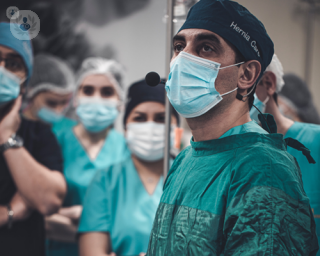

Laparoscopic hernia surgery: what to expect
Por Mr Noman Zafar
2024-12-21
A hernia is a great source of discomfort and potential complications. Laparoscopic hernia repair is a minimally invasive surgical technique used to fix hernias, offering many benefits over traditional open surgery. We speak to a revered consultant surgeon who discusses when laparoscopic surgery might be needed, how it's performed, and what you can expect from the procedure and recovery process. Ver más


What you need to know about inguinal hernias
Por Mr Rajab Kerwat
2024-12-21
If you have an inguinal hernia, you might begin to notice potential symptoms such as pain, discomfort or a lump. If you’re concerned about getting treatment for an inguinal hernia, leading consultant laparoscopic and gastrointestinal surgeon in London and Orpington Mr Rajab Kerwat provides a detailed insight to this condition in this informative article. Ver más


Incisional hernia repair surgery: All you need to know
Por Mr Dominic Coull
2024-12-21
Nowadays, hernia repair surgery is able to be performed both through minimally invasive and open procedures. In this article, highly esteemed consultant laparoscopic general and colorectal surgeon Mr Dominic Coull explains how incisional hernia repair surgery is performed, why it is necessary and how patients can expect to recover after undergoing the procedure. Ver más
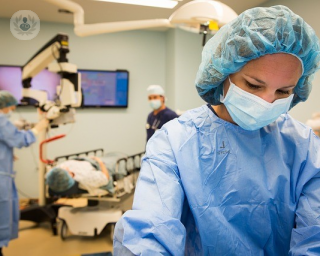

Laparoscopic hernia surgery: A modern approach
Por Mr Michail Klimovskij
2024-12-21
Hernias are a common surgical condition affecting millions of people worldwide. They occur when an organ or fatty tissue pushes through a weak spot or tear in the abdominal wall, leading to discomfort and pain. Traditional or open hernia repair technique, involving larger incisions and longer recovery periods, has been the standard approach for decades. In his latest online article, Mr Michail Klimovskij gives us his insights into laparoscopic hernia surgery which has improved the treatment of hernias, offering patients a minimally invasive alternative that promises faster recovery and reduced pain with desirable outcomes. Ver más
Doctores expertos en Reparación Laparoscópica de Hernia
-
Mr Sakhawat (Zak) Rahman
Cirugía generalExperto en:
- Colecistectomía
- Reparación Laparoscópica de Hernia
- Cirugía del páncreas
- Hernia inguinal
- Cirugía de hernia de hiato
- Cirugía de la vesícula biliar
-
Mr Michael Stellakis
Cirugía generalExperto en:
- Reparación Laparoscópica de Hernia
- Colecistectomía
- Colonoscopia
- Intestino irritable
- Hernia
- Gastroscopia
-
Mr Gianluca Bonanomi
Cirugía generalExperto en:
- Bariatric surgery
- Cirugía de la vesícula biliar
- Hernia inguinal
- Reparación Laparoscópica de Hernia
- Reflujo gastroesofágico
-
Mr Bruno Sgromo
Cirugía generalExperto en:
- Cirugía gastrointestinal superior
- Bariatric surgery
- Cirugía del cáncer esofágico
- Cirugía del cáncer gástrico
- Complicaciones de la cirugía bariátrica
- Reparación Laparoscópica de Hernia
-
Mr Shashank Gurjar
ColoproctologíaExperto en:
- Cáncer colorrectal
- Inflammatory bowel disease (IBD)
- Diverticular disease
- Cirugía hemorroides
- Cirugía de la fístula anal
- Reparación Laparoscópica de Hernia
- Ver todos

The London Independent Hospital - part of Circle Health Group
The London Independent Hospital - part of Circle Health Group
1 Beaumont Square, Stepney Green
No existe teléfono en el centro.
Si haces uso de este teléfono facilitado por TOP DOCTORS nos autorizas al tratamiento de tu teléfono para fines estadísticos y comerciales. Para más información, lee nuestra Política de Privacidad
Top Doctors

The Clementine Churchill Hospital - part of Circle Health Group
The Clementine Churchill Hospital - part of Circle Health Group
Sudbury Hill, Harrow HA1 3RX
No existe teléfono en el centro.
Si haces uso de este teléfono facilitado por TOP DOCTORS nos autorizas al tratamiento de tu teléfono para fines estadísticos y comerciales. Para más información, lee nuestra Política de Privacidad
Top Doctors

Goring Hall Hospital - part of Circle Health Group
Goring Hall Hospital - part of Circle Health Group
Bodiam Ave, Goring-by-Sea, Worthing BN12 5AT
No existe teléfono en el centro.
Si haces uso de este teléfono facilitado por TOP DOCTORS nos autorizas al tratamiento de tu teléfono para fines estadísticos y comerciales. Para más información, lee nuestra Política de Privacidad
Top Doctors
-
The London Independent Hospital - part of Circle Health Group
1 Beaumont Square, Stepney Green, East LondonExperto en:
- Cataratas
- Cirugía bariátrica
- Cirugía maxilofacial
- Cirugía neurológica espinal
- Cirugía ortopédica
- Cirugía ortopédica espinal
-
The Clementine Churchill Hospital - part of Circle Health Group
Sudbury Hill, Harrow HA1 3RX, West LondonExperto en:
- Abdominal ultrasound
- Abdominoplastia
- Acné
- Alergias Broncopulmonares
- Alergias de nariz y oídos
- Alergias Dermatológicas
-
Goring Hall Hospital - part of Circle Health Group
Bodiam Ave, Goring-by-Sea, Worthing BN12 5AT, Goring-by-SeaExperto en:
- Cadera
- Cataratas
- Cirugía de la vesícula biliar
- Cirugía General
- Cirugía ortopédica
- Hernia
- Ver todos
